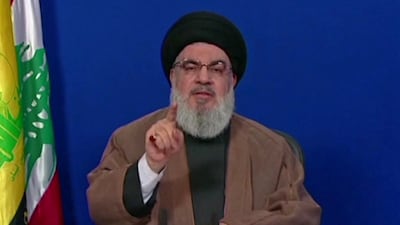Hassan Nasrallah, the leader of Lebanon’s Iran-backed militant Hezbollah group, has said Central Bank Governor Riad Salameh should resign or be stripped of his post.
Mr Nasrallah urged for action against Mr Salameh in a televised speech commemorating the Israeli withdrawal from southern Lebanon in 2000.
“In Hezbollah, we believe that there are two options. The first is for the governor to step down of his own volition,” Mr Nasrallah said. “Or, the judiciary must shoulder its responsibilities.”
Mr Salameh, 72, faces a growing list of legal troubles. France, Germany and Luxembourg are investigating him and his associates over alleged financial crimes, including illicit enrichment and the laundering of $330 million.
But until now, Lebanon's cabinet has declined from demanding Mr Salameh's removal in the absence of formal accusations from the Lebanese judiciary.
A growing number of government officials, including Saade Chami, Deputy Prime Minister of the caretaker government, have made similar calls.
But a cabinet meeting on Monday did not produce a formal decision.
And Lebanon's caretaker Prime Minister Najib Mikati, known for his long-standing support of Mr Salameh, has yet to issue an official statement on his position.
The cabinet is to meet again on Friday, although Mr Salamah's removal does not appear on the meeting's agenda, despite calls for his resignation and an Interpol red issued against him.
Mr Chami had earlier this week written a seven-page letter to fellow ministers, later leaked to the media, calling for Mr Salameh's dismissal.
Mr Salameh was questioned by a Lebanese judge on Wednesday. His Lebanese and French passports were confiscated after France issued an arrest warrant over corruption charges, effectively preventing him from travelling abroad.
Lebanon does not extradite its citizens or hand them over to international tribunals. But the judiciary is able to order Mr Salameh's arrest or file formal accusations against him.
A French judge issued an international arrest warrant earlier this month, which was followed by an Interpol red notice after Mr Salameh failed to appear in Paris for questioning.
Once regarded as a saviour for reviving Lebanon's economy post-civil war, Mr Salameh is now widely blamed for an economic meltdown that began to show tangible signs in 2019.
Economic experts say the crisis was caused by financial engineering, akin to a Ponzi scheme, aimed at increasing central bank reserves and maintaining the value of the currency 1,500 Lebanese pounds to the dollar.
The Lebanese pound has since plummeted – losing over 98 per cent of its value – and the corresponding economic crisis has wiped most of the savings of ordinary citizens.
Today over 80 per cent of Lebanon's population is impoverished.
Mr Salameh, who is also under investigation in Lebanon, denies all corruption allegations, saying his wealth came from inherited properties, investments and years spent working as an investment banker at Merrill Lynch.
He said he would only resign if convicted and announced last week that he planned to appeal against the Interpol red notice.
Mr Salameh has held his post for about 30 years. His current term will end in July.

On a regional level, Mr Nasrallah also demanded that Israel “retracts their threats and give up their arrogance”, saying that any mistake could “blow up the entire region”.
Mr Nasrallah's rebuke follows a warning earlier this week by Israel's military intelligence chief, who said Hezbollah was “close to making a mistake that could plunge the region into a big war”.
The warning came after Hezbollah conducted military exercises last week that simulated war against its southern neighbour.
Both parties are longtime enemies and technically still at war.
Agencies contributed to this report

